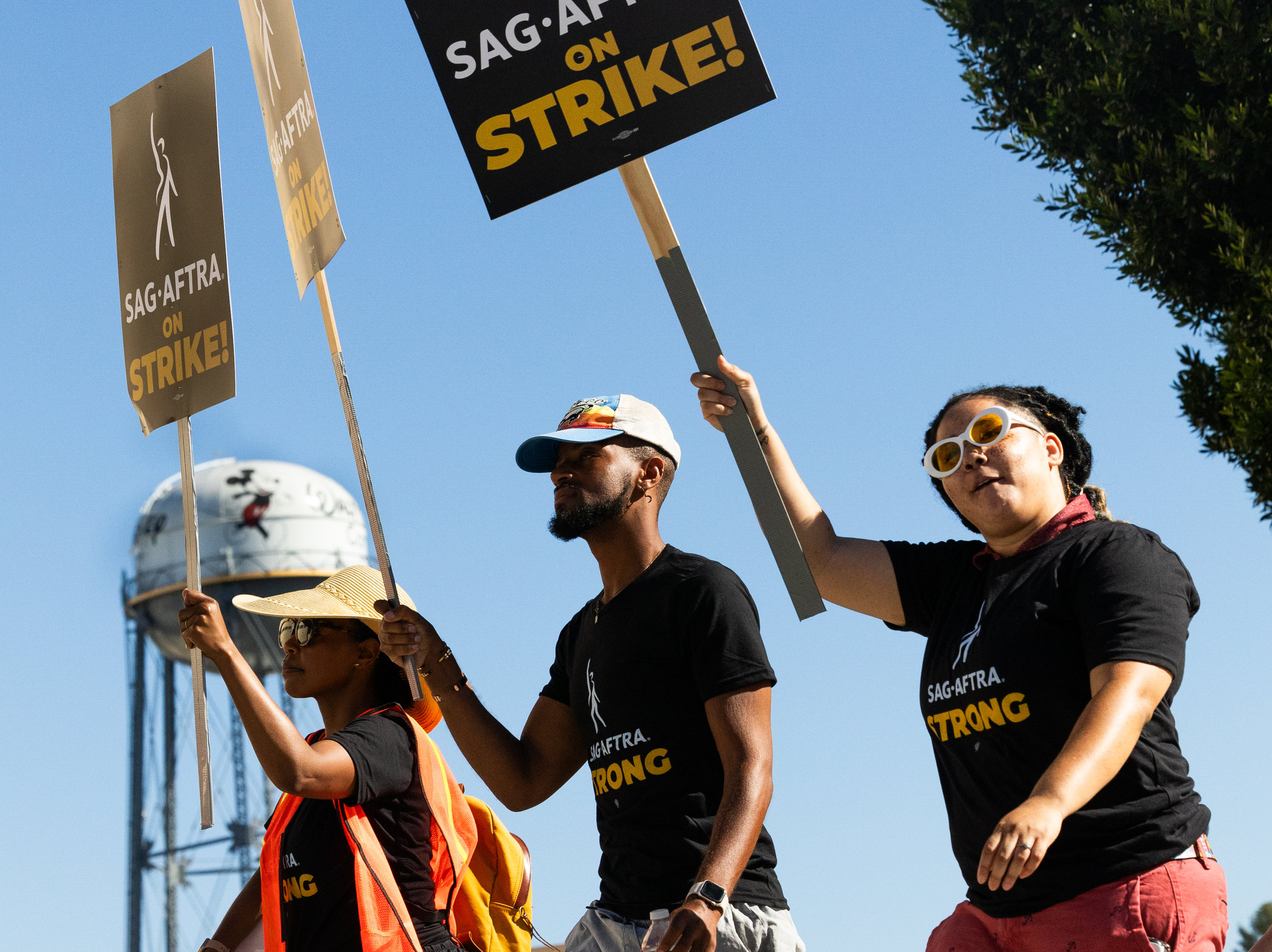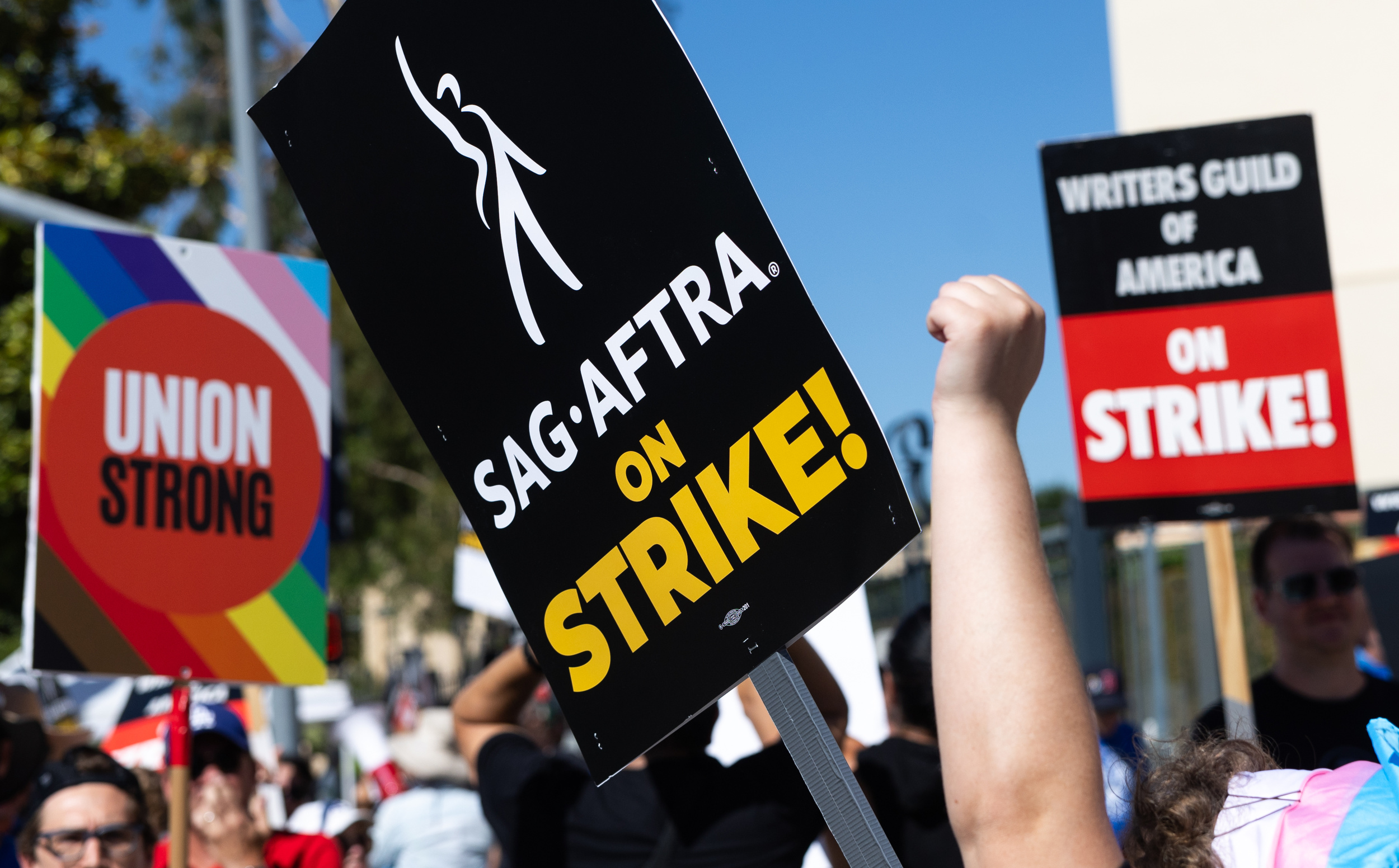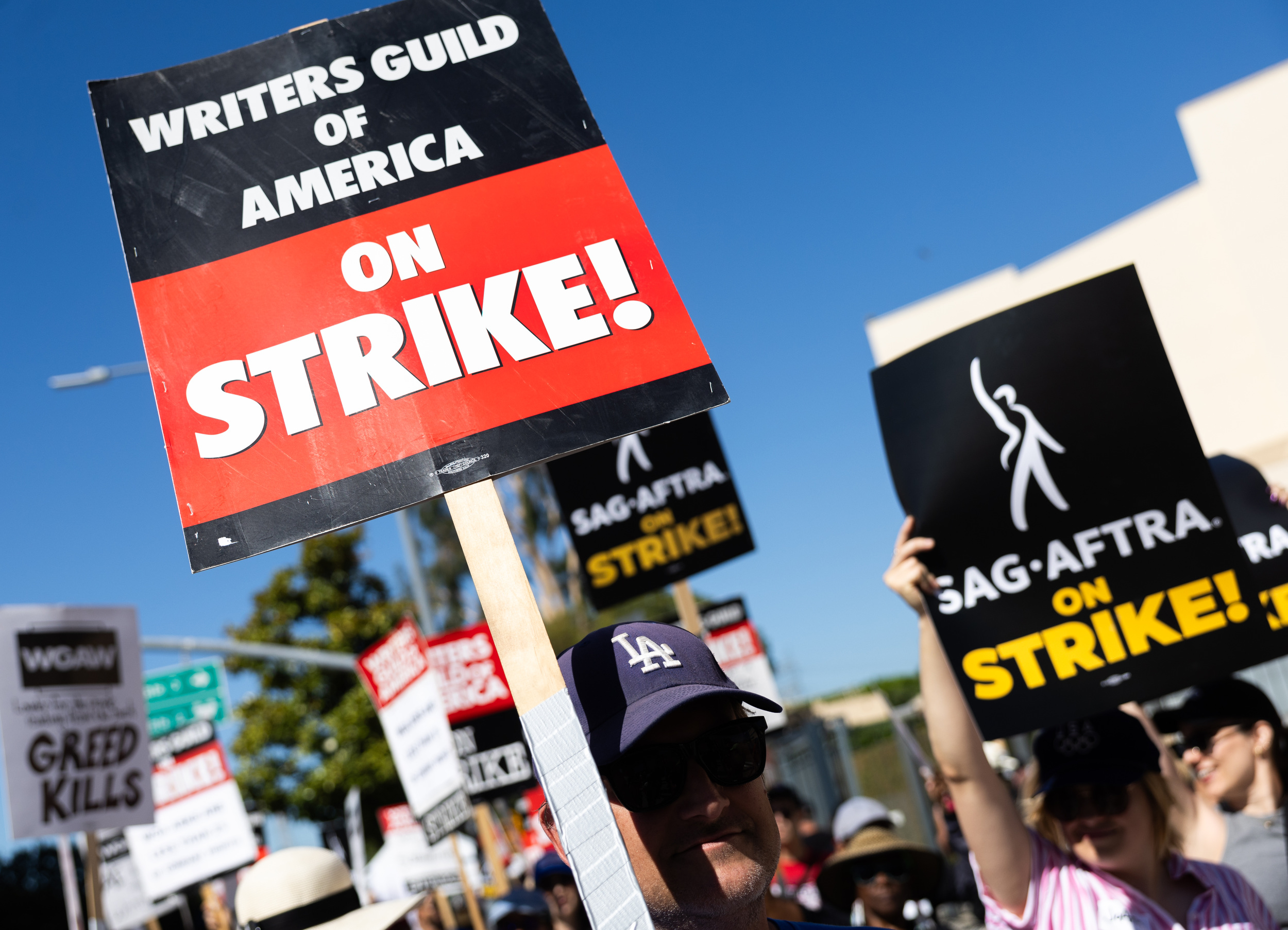Features
Sahndra Fon Dufe: What Film Industries Can Learn from the Hollywood Writers & Actors Guild’s Strike

SAG AFTRA members and supporters picket outside of Walt Disney Studios in Burbank. (Photo by Brian Feinzimer/LAist)
No new shows?
Two weeks ago, I arrived in Los Angeles and sensed a shift in the air. While the usual traffic on the 101 and 405 freeways remained, I noticed unexpected congestion on other major streets. Coming from Lagos where traffic woes are commonplace, I couldn’t help but wonder about the cause of this sudden bottleneck in LA. Little did I know that my arrival coincided with an impending strike between the Writers’ Guild of America (WGA) / Screen Actors Guild (SAG) – the American Federation of Television and Radio Artists (SAG-AFTRA) and the Alliance of Motion Pictures and Television (AMPTP). As a creative, this revelation prompted deep reflection on the strike’s implications for the government, the sector, and the artistic community.
The Writers Guild initiated the strike on May 2, 2023. The momentum intensified on July 14, 2023, when SAG-AFTRA joined in solidarity with the writers. The unified action was prompted by various reasons, including disputes over streaming residuals, the regulation of self-tape auditions, concerns about AI potentially replacing actors’ jobs, and issues with contract renewals.
The guilds brought AMPTP member companies to a halt, impacting writing, revising, pitching, and future projects. The strike’s impact reverberates from LA streets to our screens, causing chaos in America’s TV industry. It’s more than just a strike; it’s a metaphorical battle against injustice, paving the way for a fairer and more entertaining entertainment landscape. Buckle up, folks.
The Financial Impact of the Strike on Hollywood’s Creative Sector
Well, well, well, déjà vu strikes again. 15 years ago, the 2008 strike shook Hollywood off its glamorous pedestal, resulting in a staggering $3 billion loss. Jack Kyser, the Chief Economist for the LA County Economic Development Corp, breaks it down: $981 million vanished from scripted TV series production spending, $1.3 billion bid farewell to caterers, valets, and other industry-related businesses. The Golden Globe Awards suffered a $60 million downsizing, and writers and crew lost a whopping $772 million in wages. A real financial gut punch.
Experts are warning that the strike’s impact might be even worse this time. Beloved TV shows face airplay disruptions, movies have incomplete scripts, and jobs are suddenly on hiatus. Hollywood is in for a rough ride, and California’s economy feels the sting. One major film production’s daily contribution of $250,000 to the State’s economy is now a distant memory. Cash crunch, anyone?
As the strike looms larger, it could leave a trail of destruction, potentially affecting 20,000 workers across 600 productions. Approximately, $81 billion in direct wages from 800,000 jobs in the film and TV industry might vanish into thin air if this strike drags on. Kevin Klowden from the Milken Institute shares similar concerns when he said, “Could we see more? Absolutely.”
Television’s essence relies on brilliant writers creating unforgettable characters and captivating stories, brought to life by talented actors delivering powerful performances. The strike emphasises their indispensable contributions as they advocate for improved terms in collaboration with studios and networks. The absence of these creative professionals significantly impacts the entire entertainment industry, including American movie productions abroad. Shonda Rhimes, writer/producer of Bridgerton, joins the strike by affirming, “I’m a writer on strike, so for the next few months or however long it goes, I won’t be putting pen to paper.”

SAG AFTRA and WGA members and supporters picket outside of Walt Disney Studios in Burbank. (Photo by Brian Feinzimer/LAist)
Residuals and the Writers’ Quest for Equity
Residuals are vital for many writers, especially as consumption patterns in the entertainment industry evolve. Hollywood figures, such as the creators of Stranger Things, Matt and Ross Duffer, have supported this claim. They tweeted, “Writing does not stop when filming begins.” Meredith Stiehm, President of the Writers’ Guild of America, emphasised the need for payment reviews for writers in an open letter to Netflix and Comcast, stating, “Shareholders should send a message to Comcast that if the company could afford to spend $130 million on executive compensation last year, it can afford to pay the estimated $34 million per year that writers are asking for in contract improvements and put an end to this disruptive strike.”
Job security amidst the development of A.I
Technology’s disruptive force extends to America’s film industry as well. Today, many writers work multiple jobs to support themselves and their families while holding onto their writing jobs. As Artificial Intelligence (AI) gains prominence, studios consider integrating tech writing into the scriptwriting process for greater flexibility. However, the union actively seeks protection against it.
Uncovering the Core Issues
The Writers’ strike centres around the demand for improved residuals from streaming media, the inclusion of all types of media in the latest Minimum Basic Agreement (MBA), “Mandatory Staffing” and “Duration of Employment” terms in their contract, as well as access to pension and healthcare funds for all members. Prominent show writers like Tina Fey, Quinta Brunson, and Debra J Fisher have joined the strike. Similarly, over 1,000 SAG members have also joined the strike, including esteemed A-listers like Lupita Nyong’o, Rachel McAdams, and Bob Odenkirk.
Today’s television landscape has evolved to embrace diverse forms of visual media. Writers now specialise in streaming, digital media, and other mainstream platforms that align with current audience consumption habits. However, despite adding new coverage assets, writers’ paychecks have seen a significant drop of 23% over the last decade due to inflation rates. The guild highlights, “The companies have used the transition to streaming to cut writers’ pay and separate writing from production, worsening working conditions for series writers at all levels.”

SAG AFTRA and WGA members and supporters picket outside of Walt Disney Studios in Burbank. (Photo by Brian Feinzimer/LAist)
Harmonising all writers’ interests
TV writer Franchesca Ramsey debunks a widespread belief surrounding the writers’ strike. She explains that not all film and TV writers are wealthy and discusses the challenges they face, especially with the impact of streaming services on their income. Ramsey mentions ‘The Bear’ on FX, where a new staff writer, Alex O’Keefe, earned very little during the nine-week writer’s room. Despite a $5,000 minimum weekly payment, after expenses for managers (10%), agents (10%), lawyers (5%), business managers (5%), and taxes (4%), writers are left with only about $30,000 to cover living expenses for an uncertain period. The unpredictable nature of show success and the disappointingly low streaming residuals further add to the challenges writers face in sustaining themselves.
“Then The Bear comes out on TV and it’s a huge hit on streaming and when the residual check comes, it’s nothing because you barely get any money for residuals on streaming. So this is what the Writer’s Strike is fighting for. Fixed residual income based on streaming viewership. Restrictions on mini rooms so that you aren’t overworked and you aren’t underpaid,” she explained.
The strike’s impact reaches beyond Los Angeles, as the television industry is a global enterprise with shows across borders. The writers’ strike showcases the interconnectedness of the entertainment ecosystem, where creativity and talent transcend geographical boundaries. Its resolution could serve as a model for addressing labour disputes in other regions, inspiring worldwide conversations about fair compensation and creative rights.
Learning Opportunities for African Film Industries
The impact of the writers’ strike is worth exploring as it sheds light on the situation of African film industries. The absence of writers might result in a lack of new shows and fresh content. Nevertheless, this presents an opening to expand into global markets and gain acknowledgement. Nigeria, South Africa, and other African countries have dynamic film industries with distinct narratives that are eager to be showcased to a broader audience.
The persistence of these issues in Hollywood from the early 1900s should serve as a beacon for us in Africa to enhance our movie industries’ structure. As we strive to make our film industries a global export, it is essential to unite and align the interests of actors, writers, producers, and directors in the development of African cinema.
We must apply these lessons to the film industries in Africa as we navigate the writers’ strike’s intricacies and its implications for television’s future. Standardising the sector is vital for African cinema to reach its potential and elevate the quality and impact of African shows to captivate audiences worldwide. Drawing from the practices of creative counterparts, film bodies in Africa should implement policies that foster a cohesive and enabling environment for stakeholders. Taking inspiration from the example of Advertising Practitioners of Nigeria (now known as ARCON), which standardised advertising operations in August 2022 through levies and promoting local content, movie bodies in Africa can adopt similar measures to drive the growth of the creative industry.





















